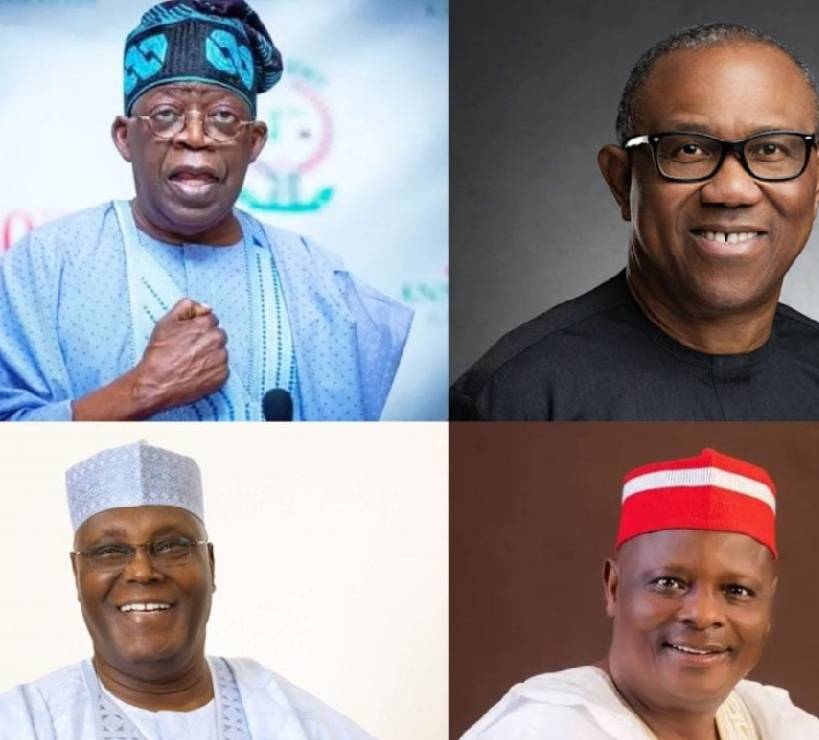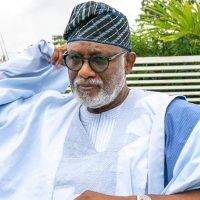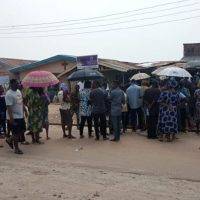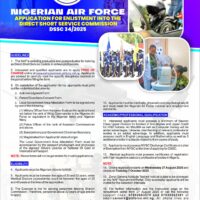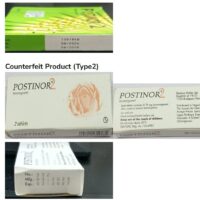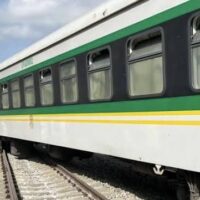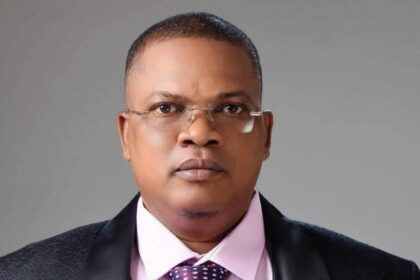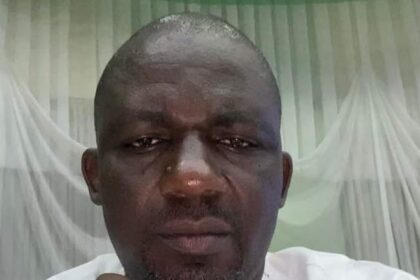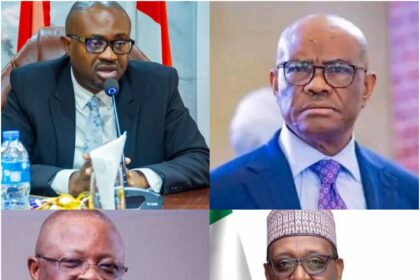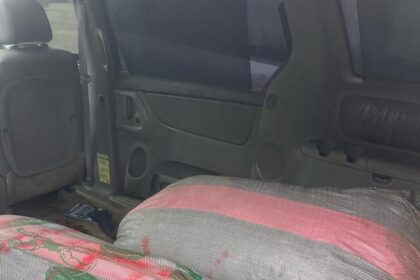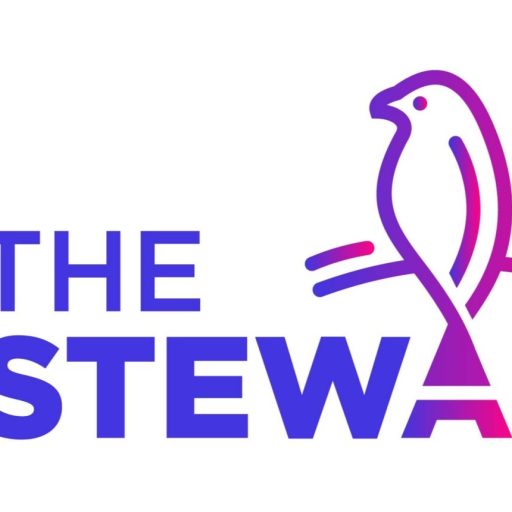In less than 24 hours, Nigerians will troop out to elect the next president for the largest country in Africa. The nation has been presented with 18 presidential candidates; however, if the spread and campaign activities are to be used as a yard-stick, the race is shaping to be a four-horse race.
Atiku Abubakar of the Peoples Democratic Party (PDP), Bola Tinubu of the ruling All Progressives Congress (APC), Peter Obi of the Labour Party (LP), and Rabiu Kwankwaso of the New Nigeria Peoples Party (NNPP) are the candidates that have been campaigning across the country.
In this analysis, DAILY POST will review the factors that will determine the outcome of the election across states, putting into consideration the structure of the parties and the historic voting pattern of the states.
The campaigns have been dogged by ethnic and religious colouration- for example, the candidate of the Labour Party has been criticised for visiting churches, while Tinubu and Atiku have been criticised for making ethnic-infused comments.
For the candidates to win, they must fulfil the two conditions mentioned in the 1999 constitution, which provides that a candidate must get a simple majority of the vote cast and 25 percent in 24 states and the FCT.
Southeast
The region has five states- Abia, Ebonyi, Anambra, Enugu and Imo states and due to ethnic colouration, are expected to go to the presidential candidate of the Labour Party, who is a former Governor of Anambra State. However, these states are traditional PDP voting states and the Labour party has no single governor in the region.
Poor turnout may be expected in the region due to the activities of the unknown gunmen and IPOB. It would be recalled that Simon Ekpa, the factional leader of the group, declared a sit-at-home order in those states.
In Anambra, Peter Obi is expected to perform well because of home advantage. In 2019, as the running mate to Atiku, they polled 524,738 votes representing 86.63% of the total votes. However, that may be a bit hard now because PDP has some strong senatorial candidates like Chris Uba, Stella Oduah and Mary Ekwunife.
Also, the governor of the state, Charles Soludo openly opposed the candidacy of Obi, saying there is no path to victory for him. But that being said, Obi is expected to pick the state.
LP, PDP, APGA/APC
Abia State
This traditional PDP voting state is faced with the obedient movement and the G5 governors’ influence. Governor Okiezie Ikpeazu is a member of the rebellious PDP governors that have refused to endorse the presidential candidate of the PDP, although the governor has refused to endorse anyone.
The reason could be that the Obidient movement threatens his political structure, as voters may vote LP across the board, a decision that may affect his senatorial ambition and others in the PDP.
Also, there is former Governor Orji Uzor Kalu in Abia North, whose effort in the last election afforded the APC over 25% of the total votes.
LP, PDP, APC
That said, Obi is expected to win the state.
Ebonyi State
Ebonyi is also another state that Obi is expected to win, but he will have to battle with the structure of the APC, where governor Dave Umahi, for the very first time, is running on a platform that is not PDP.
The PDP is suffering from internal conflict in the state, but with strong National Assembly members and historic voting prowess, PDP cannot be totally written off.
LP is expected to carry the state, but not with blown out margin
In this order LP, APC, PDP
Imo State
In Imo State, Governor Hope Uzodinama has a top job to deliver the state for the APC, a tall order considering the circumstances of his emergence as governor of the state through the Supreme Court.
PDP won the state during the last presidential election with 65% of the total votes cast, while APC got 27.5 percent.
As in most other states, Labour Party can be considered a disruption in most southeast states, therefore, the party is expected to win this state.
However, if Uzodinma keeps traditional APC voters, they may maintain second, but the second position is too close to call between APC and PDP, but the odd favours PDP.
LP, APC/PDP
Northcentral
No one has won the presidential election without winning the Northcentral. Although the region does not boast of bloc votes like the Northwest, however, because of the diversity of the people there, it tells of the acceptability of a candidate.
The region is not homogeneous— not united by language, culture or religion; to show how competitive the region is, all the candidates are popular here. Another thing is that it appears PDP and Labour are going after the same sets of voters.
Benue State
A number of polls have called the state for the Labour Party and the endorsement of Obi by Governor Samuel Ortom have been seen as significant. However, several factors make the state too close to call.
While Ortom is the governor, however, other PDP bigwigs like former Governor Gabriel Suswan and Senator Abba Moro are on the ballot on Saturday as candidates of the PDP, including the governor himself. Even the national chairman of the PDP, Iyorchia Ayu is from the state.
However, the anti-Fulani rhetoric of the Governor may present a challenge, as the PDP will have to market Atiku to voters.
On the part of the APC, there is the factor of Father Hyacinth Alia that appears to be some sort of movement in the state; he has equally been campaigning for the candidate of the APC, Tinubu. Even the daughter of former Senate President, David Mark is in the APC, and it is hard to underestimate her; she defeated her uncle in the last election when she contested on the platform of APGA.
It could be any of the candidates: APC/PDP/LP
Plateau
The Labour Party candidate is expected to win Plateau State particularly due to the enthusiasm of the young people; however, there is a common thread when analysing supporters of LP, they are mostly urban youth and women.
His ability to win the state depends on the work done in rural places outside the capital because the PDP is also strong in the state and there is the APC factor, where governor Simon Lalong is a senatorial candidate in Plateau South.
The APC may get backlash due to the party’s Muslim/Muslim ticket. Even in the Muslim community, the votes will be between PDP and APC.
LP but with a slim margin— APC/PDP
Nasarawa
This state is another clear example of LP and PDP chasing similar voters. In Nasarawa State, PDP will have to rely on party structure to deliver the state, as voters in Mararaba, Masaka and other places close to Abuja in Karu Local government area of the state may vote Obi.
APC will rely on the National Chairman, Abdulahi Adamu, Governor Sule Abudulahi and Tanko Almakura to deliver the state for the ruling party.
Because of the division in the opposition, APC is projected to take the state by a slim margin, while the second place is too close to call.
APC, LP/PDP
Kogi State
In the last election, APC won Kogi State by a slim margin with 54.8% of the total votes cast; with the recent economic situation and the Naira scarcity, the state should have been a battle ground, however, there is the impact of Peter Obi in this election that may take youths that ordinarily would have voted Atiku and the PDP.
There are also concerns about electoral violence in the state and the incidents of bomb blasts in Okene. All these may discourage some voters in the state.
Natasha Apoti and some PDP bigwigs are expected to make waves for Atiku, but the APC may enjoy some enthusiasm in Kogi West— particularly in the Okun speaking part, who may sympathise with Tinubu. It will be a battle between Dino Melaye and James Faleke in Ijumu LG.
Because of the Obi factor, APC may win the state.
APC, PDP, LP
Niger State
Niger state, a state that is always mentioned at every presidential election, because any serious candidate must visit Abdulsalam Abubakar and Ibrahim Babangida at their hilltop mansions.
Niger State is currently a battleground between the APC and the PDP, where both held rallies with massive crowds. Ordinarily, APC would have been the favourite because of its structure in the state.
In the last election, the state cleared every single elective position, and APC won with over 71% of the total votes cast in the election during the presidential election. And there is the incumbent governor of the State, Abubakar Sani of the APC.
However, many believe that all is not well within the APC in the state. Umar Bago, the governorship candidate of the APC emerged despite not being the candidate of the governor.
Although the governor claimed that he did not anoint any candidate for the primary, however, there were indications that the governor backed Mohammed Idris, the publisher of Blueprint newspaper, but was defeated.
The odds still favour the APC in the state, however, it is fair to state that it is too close to call.
APC/PDP and LP.
Kwara State
The state will be facing the review of the “O to ge” movement that displaced the Saraki Dynasty in the state. The PDP, led by former Senate President Bukola Saraki is proposing “O su wa” a Yoruba phrase that means “we are tired”.
The APC in the state has gone through internal combustion that broke it into three— APC, SDP and YPP. Also, Saraki has intensified his campaign around the state on a ward to ward level, and the decision of his party to zone the governorship ticket to Kwara North, a zone that last produced a governor in 1992, may be a huge advantage for the party ahead of the election.
Both SDP and YPP have fielded strong senatorial candidates that may affect the party in rural areas.
All these factors favour the PDP, however, there is the factor of Tinubu’s name in the state. It is a household name.
APC is projected to win, but after a strong battle.
APC, PDP
FCT
Because of the cosmopolitan nature of the FCT, the LP candidate has been projected to win the FCT, a good call considering the factor on the ground, however, FCT has large rural components across the territory.
LP will be getting votes from traditional PDP voters and first-timers. LP is expected to take the FCT but it will be hard to underestimate long-term senator, Philip Aduda of the PDP and Zakari Angulu of the APC, both running for senate seats.
APC is expected to pull some numbers in Abuja South— Gwagwalada, Kwali, Abaji and Kuje, although Hassan Sokodabo, the PDP rep member in the constituency and urban voters in Gwagwalada may further hurt the APC.
That being said, LP is projected to win with a slim margin, the second position is too close to call.
South-south
South-south is another battle ground in this election that many would not have envisaged 12 months ago. The political map of Nigeria has tremendously changed in the last 12 months.
There are the G5 governors and the Obi factor. These two factors turned the zone into a battle ground. Ordinarily, PDP would have swept this region leaving the APC to fight for 25%.
Edo State
In 2019, APC polled 47% of the total votes cast, however, the fortune of the party has changed since then; it lost the governorship seat after the governor defected to PDP before the governorship election.
Now, the APC has been reduced to Edo North Senatorial district where Adams Oshiomhole is the senatorial candidate of the party.
Unfortunately for the PDP, the party will have to share its fortune with the Labour Party, particularly among the youths. While governor Godwin Obaseki is always quick to dismiss the movement, his prediction that the movement will fizzle out is yet to be seen.
Then, there is the internal crisis within the PDP where a group led by Dan Orbin receives orders from the Governor Nyesom Wike of Rivers State.
The state is hard to call, a candidate with less than 35% of the total votes cast may win the election. Ordinarily, APC should not be in consideration, but in a three-horse race, if APC keeps its traditional voters while LP and PDP share spoils—a surprise may not be far away.
LP/PDP—Not ruling out APC completely.
Delta
The state of the vice presidential candidate of the PDP is one interesting state in this race. This state will go to the PDP because the party is obviously strong and there is more incentive for voters to turn out because of Okowa.
Among the young people, the LP has significant sympathy.
Also, there is the APC, where the party polled 26% of the total vote cast in the last election. But in the current cycle, it is hard to see how the APC can flip the state, particularly with its Muslim/Muslim ticket and the naira policy.
Meanwhile, there is the reported cold war between Okowa and former Governor James Ibori over the governorship seat, however, not much movement has been observed from that quarters to suggest PDP losing the state. One question that remains- will the total vote cast in Delta State cross a million votes?
PDP, APC/Labour
Akwa-Ibom
Governor Emmanuel Udom is the Chairman of the Atiku Presidential campaign team, and he is expected to deliver the state. To do so, he will have to outmatch the Obidient movement, while keeping in mind former Governor Godswin Akpabio of the APC.
In 2019, Akpabio was able to get 30% of the votes cast in Akwa-Ibom, but the recent crisis in the APC presents a challenge for him; however, there is a great deal of uncertainty hanging over the PDP, particularly as regards the governorship candidate.
That said, the PDP is expected to win the state.
PDP, LP, APC— it will be a close contest between LP and APC for the second position.
Bayelsa
This state is going to be a strong battleground between the PDP and APC as some sort of a litmus test for the governorship election.
Governor Diri Douye will have to use this election to establish his status in the state considering that he lost the governorship election in November 2019 against David Lyon; it took the intervention of the court for Douye to emerge.
As it stands, Lyon and the minister of petroleum resources (State), Timipreye Sylva have already procured the N50 million nomination and expression of interest forms.
Local politics will determine the outcome of this election, but odds favour the PDP to win the state, however, the race is too close to call.
Cross River
Governor Ben Ayade will fancy his chance to for the first time deliver the state for the party; however, like most south-south states, Cross River has consistently voted PDP, and with Labour Party making waves among the young people, it is going to be an interesting battle.
To exercise caution, it is best to declare that the state is too close to call.
Rivers
There is a serious battle going on in Rivers, it is PDP vs PDP, so the question remains, who is going to reap from the division, is it APC or LP.
Events in the past couple of weeks show that there is a deliberate attempt by Governor Nysome Wike to deliver the structure of the state to Tinubu, however, there are people still loyal to Atiku.
Wike appears not to be taking chances against them. It would be recalled that a member of the House of Representatives, Chinyere Igwe was arrested by the police on Friday with about $500,000.
But while this battle is ongoing, LP may take the state due to popular support. Therefore, Rivers is too close to call.
Northwest
This region has the highest block votes and the famous KKKK states (Kano, Kaduna, Kebbi and Katsina), that can alter the fortune of any candidate. Without Buhari not on the ticket, PDP, APC and NNPP are in serious battle to take the states.
Jigawa State
In Jigawa State, the battle is between Governor Abubakar Badaru and former Governor Sule Lamido. Whoever wins the battle will take the state.
APC had to grapple with post primary election defections, and there is the entry of the NNPP into the picture. Although APC remains strong, it is hard to call.
APC/PDP could take it to the wire— while NNPP will be close by
Kano State
Kano State has essentially turned into a two-horse race between APC and the NNPP, a rehearsal of the last governorship battle between Ganduje and Rabiu Kwankwaso’s inlaw.
It will not be strange if the two parties get 1 million votes apiece. NNPP is strong in Kano Central, while the APC is strong in North and South.
PDP has not been able to cause enough stir in the state, even the decamping of former Governor Ibrahim Shekarau has not caused sufficient excitement.
Too close to call, but odds favour Kwankwaso, however, it remains a tough battle.
Zamfara State
Every single power bloc in Zamfara seems to be in the same party, APC, except perhaps Gen Mohammed Gusau who remains in the PDP.
The feelers from the state show that APC will probably win the state, but the margin is not that clear as the impact of the Naira redesign policy has to be put into consideration.
APC is projected to win, PDP and NNPP are to follow closely.
Katsina State
It may sound crazy, but Katsina State may go with the PDP due to a number of factors, one is the anger over insecurity and economic hardship. Secondly, the crisis in the APC has led to the migration of several members of the party.
The question is, is the president’s influence sufficient to get the win for the APC?
Therefore, PDP may likely take the state, however, PDP is equally battling with its challenges, particularly the former Governor of the state, Ibrahim Shema, who has refused to endorse the governorship candidate of the PDP, in response, Governor Aminu Masari and the state decided to discontinue the N11 billion corruption case against him.
PDP, APC, NNPP
Kebbi State
The situation in Katsina is similar to what is happening in Kebbi; former Governor Adamu Aleiro and former Senate Leader, Yahaya left the APC over ticket, and they were given the tickets in PDP.
Although APC remains strong, the fight remains tough and therefore difficult to call.
APC/PDP, NNPP
Kaduna
Kaduna State is historically divided into North and South, and for the past two election cycles, APC has retained the North, while PDP is strong in the Southern part of Kaduna.
With LP making strides in the South among Christians, this could further divide the votes of the PDP.
This development tilts the election to APC.
APC, PDP and LP/NNPP
Sokoto
If incumbency and ethnicity were the only factor in Sokoto, then PDP would be the obvious choice, but the local politics in Sokoto State, particularly the rivalry between Governor Aminu Tambuwal and his predecessor, Wamakko has turned the state into a battleground.
This state could swing in any direction, therefore, the state is too close to call.
Northeast
The Northeast geopolitical zone presents the battle between APC Vice Presidential candidate, Kassim Shettima and Atiku Abubakar.
Borno and Yobe
These two states have similar voting patterns and are expected to go in the direction of the APC because of the influence of the vice presidential candidate, who is a Kanuri man.
But the PDP is expected to do better in this election now that Buhari is not on the ballot. However, with Peter Obi trying to poach minority voters in Southern Borno, the PDP may be concerned.
It is yet to be seen how Muslim/Muslim ticket of the APC will cause dissatisfaction in those states, but the APC will win by a considerable margin.
APC, PDP, LP/NNPP
Adamawa
Adamawa State, the state of Atiku, should deliver a large margin for the PDP, unlike in 2019 where Buhari got substantial votes, this time around, APC may have to target the 25% requirement.
The Labour Party will depend on Babachir Lawal to get Christian voters, however, the target will be 25%.
The Labour Party will depend on Babachir Lawal to get Christian voters, however, the target will be 25%.
Bauchi and Gombe
In Bauchi State, Governor Bala Mohammed has the popularity to deliver the state; Atiku is also popular in the state, and with Buhari out of the way and Yakubu Dogara seeking to punish Tinubu for the Muslim/Muslim ticket, PDP will definitely take Bauchi.
In Gombe State, it is a battle between Atiku Abubakar and the Governor of Gombe State, Inuwa Yahaya of the APC. The state is too close to call.
Taraba State
This is one state many expect Peter Obi to win because of religious sentiment, however, the structure of the PDP and APC is strong in the state.
The odds favour the PDP because of the internal crisis in the APC; however, it will be a close contest.
It is LP, PDP, and APC

